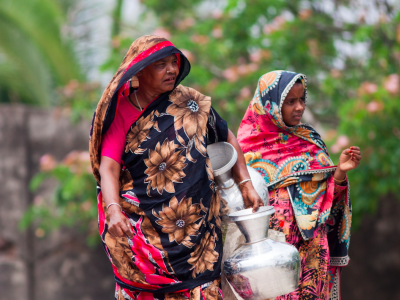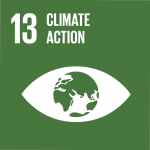UNDP launches the Adaptation Innovation Marketplace at the Gobeshona Global Conference 2021

The Gobeshona Conference is a weeklong series of dialogues hosted by the International Centre for Climate Change and Development (ICCCAD), and brings together scholars, policy-makers, researchers and practitioners to share knowledge, research and practical experiences on climate change issues. In previous years, the Conference was held in Dhaka and attracted multidisciplinary groups from across Bangladesh and in Asia. However, the on-going global pandemic did not halt the annual dialogues, but rather gave the Gobeshona Conference the opportunity to go fully digital and global for the first time.
January 2021 - UNDP has partnered with the Gobeshona Conference for the past four years and participated in the continued dialogue on locally led adaptation. This year, UNDP hosted a session that convened partners and countries from various time zones to discuss best practices and exchange experiences on locally led adaptation – finance, innovation and scale. The event opened with remarks from Mr. Pradeep Kurukulasuriya, the Director of UNDP's Nature, Climate and Energy Department on the importance of the Gobeshona Conference platform for UNDP’s on-going work to harness local climate action.
A new Adaptation Innovation Marketplace
One of the key challenges for local communities and local business to take action in adapting to climate change is access to capital and investment. At the same time, investors struggle to find a strong and compelling pipeline of investable ideas, especially for micro, small and medium enterprises. As a solution to bridge this gap between innovative initiatives and potential funders, UNDP launched the Adaptation Innovation Marketplace during the ‘Locally Led Adaptation – Finance, Innovation and Scale’ session at the Gobeshona Global Conference.
Ms. Srilata Kammila, the Head of Climate Change Adaptation – Nature, Climate and Energy at UNDP explained, “the main focus of AIM [the Adaptation Innovation Marketplace] is to source the best ideas from around the world, the best innovations for adaptation, building on UNDP’s support for innovations to providing financial and technical assistance, and learning to replicate and scale solutions at the local level.”
The Adaptation Innovation Marketplace was developed in a partnership between UNDP, ICCCAD, the Adaptation Fund, the European Union, the Global Environmental Facility (GEF), the Global Resilience Partnership and Climate-KIC. A video message from UNDP’s Administrator Mr. Achim Steiner describes how the Adaptation Innovation Marketplace will accelerate innovative technologies, practices and business models for local adaptation through tapping into the incredible potential of NGOs, civil society, women and young innovators.
How the Adaptation Innovation Marketplace nurtures transformation
Local communities and entrepreneurs have the local knowledge and ideas to innovate or re-interpret the technologies or techniques needed to make their local realities more resilient to climate change. The Adaptation Innovation Marketplace aims to match these local innovators with funders and provide the technical assistance needed to meet their local adaptation objectives.
During this session, Adaptation Innovation Marketplace partners shared their own experiences in climate financing and innovation while celebrating the launch of the Marketplace and its potential to accelerate locally led adaptation.
Mr. Jason Garth Spensley, the Senior Climate Change Specialist at the GEF, praised two key functions that the Adaptation Innovation Marketplace will play: strengthening the pipeline of ideas and enterprises through technical assistance, and matchmaking between grassroots organizations, innovators and entrepreneurs with donors, investors and the private sector.
Mr. Nathaniel Matthews, the CEO of the Global Resilience Partnership, also noted, “communities and countries build resilience in a world of uncertainty and are really dependent on their capacity to anticipate, plan and take action to respond to a wide range of risks. And I think this is where the Adaptation Innovation Marketplace is really critical. It’s both a long-term commitment and a focus on equitable and inclusive and innovation adaptation.”
In the context of the global COVID-19 pandemic and increasing climate impacts, Mr. Tom Mitchell, Chief Strategy Officer, Climate-KIC, concluded that “one of the real benefits of the Adaptation Innovation Marketplace, is that it’s not just a platform for solutions meets investment, but also to create the bigger ecosystem that can nurture the kind of transformation we now need.”
Sharing best practices of locally led adaptation
Recognizing the value of the Adaptation Innovation Marketplace in supporting locally led adaptation, distinguished panelists from grassroots organizations to national governments shared their own community-level adaptation experiences.
Ms. Sonam Pem of the Tarayana Foundation in Bhutan described the best practices used in their holistic community development approach. The Tarayana Foundation relies on local and Indigenous Knowledge to resolve water shortages and food security issues with the local communities. Ms. Pem emphasized the critical role of grassroots organizations to bridge the gap between communities and government.
Mr. Washington Zakata of the Government of Zimbabwe described their participatory approach in all levels of adaptation planning to ensure that even the voices of the most marginalized groups are heard in the development of the national adaptation plan. He highlighted that in programming interventions; beneficiaries should be able to participate in proposed actions. When communities assume ownership over interventions the actions will result in sustainability and resilience building.
From the government of Papua New Guinea, Ms. Debra Sungi shared the country’s experiences in developing the adaptation priority in their second Nationally Determined Contribution (NDC) and how it was based on expansive stakeholder engagement and the challenges that still remain ahead in terms of support for rural and vulnerable communities and the need for climate financing.
The National Coordinator of GEF Small Grants Programme at UNDP Jamaica, Ms. Hyacinth Douglas shared key success stories in locally led adaptation, such as the planning process with community-based organizations, the development of strategic partnerships, the establishment of strong policy environment for scalability, and the promotion of projects through knowledge products and shared learning.
The session moderator, the Lead Technical Specialist on National Adaptation Plans at UNDP, Ms. Rohini Kohli, concluded by remarking upon the perceived disconnect between national level efforts in enhancing local adaptive capacities and local actions in building the resilience of local communities and posed thought-provoking questions on the way forward. First, how can locally led adaptation efforts be nurtured through enhanced adaptation ambitions within the NDCs? Second, how can we use COVID-19 green recovery efforts to stimulate local adaptive capacity and, vice versa, support local community livelihoods for the green recovery?
This event is one of a series of engagements dedicated to UNDP’s commitment to the Locally Led Action Track of the Global Commission on Adaptation. Later this month, UNDP will engage in the same theme at the Climate Adaptation Summit and UNDP will be endorsing principles on strengthening locally led adaptation over the next ten years with a host of other partners. Creating spaces, platforms and resources to build climate resilience at the community level is integral and aligns with UNDP’s parallel work on the NDCs and the Climate Promise.
Story by Stephanie Austin, Climate Promise – Climate Change Adaptation Specialist/UNDP with support from Melanie Pisano, Climate Change Communications Specialist/UNDP
